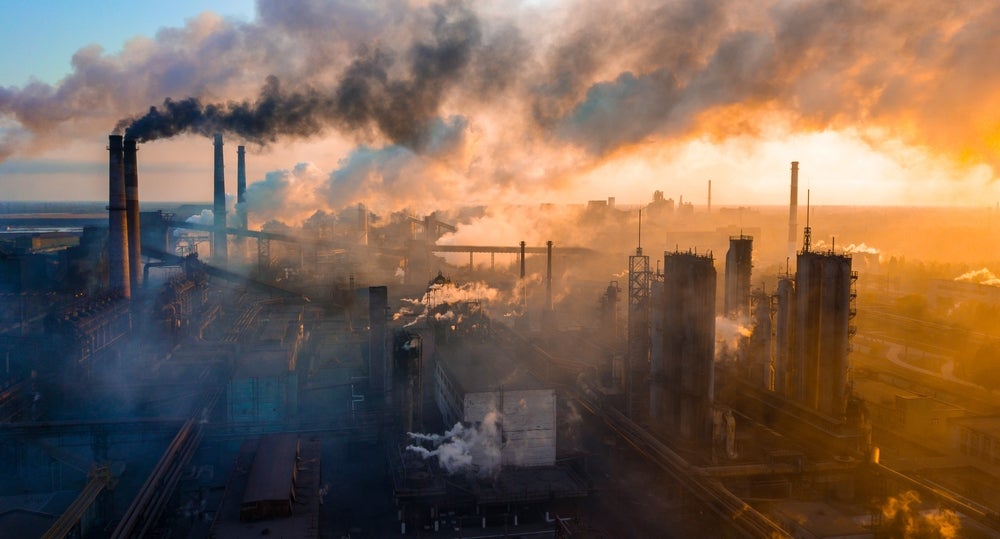
The world’s biggest fossil fuel companies owe at least $209bn in annual climate reparations, according to a study published on 19 May by environmental research group One Earth.
The study, titled Time to pay the Piper, is the first to quantify the global economic burden of fossil fuel activity. It builds on a carbon majors database, which tracks and records the emissions of oil, gas and coal companies.
“Fossil fuel companies have a moral responsibility to affected parties for climate harm and have a duty to rectify such harm,” the authors of the report wrote. The reparations are to compensate communities worst affected by pollution caused directly from these businesses, they say.
The report analysed the carbon emissions of the top 21 fossil fuel producers between 1988 and 2022, counting both Scope 1 and Scope 3 emissions, as well as their percentage of global emissions. The authors calculated that cumulative reparations owed by the 21 companies totalled $5.44trn, which they suggest should be paid over a 25-year period between 2025 and 2050, equalling on average $209bn per year.
In the name of financial equity, the study based total reparation sums on the economic status of each company’s country of origin. Adjusting reparations in this way would entail larger contributions from wealthier governments in terms of tax revenues, domestic subsidies, employment, and social programmes.
Companies headquartered in wealthier nations are expected to pay the full cost of their pollution. However, Gazprom, Iraq National Oil, Pemex, Petrobras, PetroChina and Rosneft, considered to be headquartered in low-income countries, would be required to pay only half of their total calculated reparations. Coal India, National Iranian Oil, Petroleos de Venezuela, and Sonatrach are exempt altogether from payments.
Regarding cumulative emissions, Saudi Aramco came out on top by some margin. According to the study, the state-owned company produced 53,714 metric tonnes of CO2 equivalent (MtCO2e) between 1988 and 2022, contributing 4.78% to global emissions. ExxonMobil and Shell placed third and fourth, contributing 2.06% and 1.82% to global emissions in the same time frame respectively.
Saudi Aramco owes $1.1tn in total reparations, an average of $42.7bn per year until 2050. ExxonMobil and Shell each owe $478bn and $424bn respectively, or $18.4bn and $16.3bn annually.
The study suggests that proposed reparation payments are in line with soaring industry profits. For example, ExxonMobil’s third quarter 2022 profits of $19.7bn alone exceed its annual reparations bill.
“Crimes against humanity and nature”
By paying the suggested reparations, companies would contribute to the burden of fighting climate change, the report said, as natural disasters and sea level rise are predicted to become worse in the coming decades.
“As increasingly devastating storms, floods and sea level rise bring misery to millions of people every day, questions around reparations have come to the fore,” Harjeet Singh, head of global political strategy at NGO Climate Action Network International said to The Guardian.
“This new report puts the numbers on the table – polluters can no longer hide from their crimes against humanity and nature.”
Reparations would provide “necessary funding to mitigate emissions, fund adaptation, and compensate subjects more vulnerable to climate harm such as climate migrants and refugees, Indigenous peoples, racial and ethnic minority communities, people with disabilities, and people who are socially and economically disadvantaged,” the report said.
“The world’s richest 1% of the population contributed 15% of emissions between 1990 and 2015, more than twice as much as the poorest 50%, who contributed just 7% but who suffer the brunt of climate harm,” the authors wrote, centring debate on who should fairly pay for the fallout of climate change.
The authors of the study consider the calculations to be “conservative”, as the research methodology excludes the economic value of lives and livelihoods already lost – and due to be lost – as a result of climate and environmental breakdown. It also excludes the cost of biodiversity loss and species extinction, which is predicted to get considerably more severe in the coming decades as the globe continues to warm.
Shell said to The Guardian: “The energy system is the result of society’s choices about everything from transport to land use over many decades. Addressing a challenge as big as climate change requires unprecedented collaboration where everyone has a role to play. For our part, we are reducing our own emissions and working closely with our customers to help them reduce theirs.”



